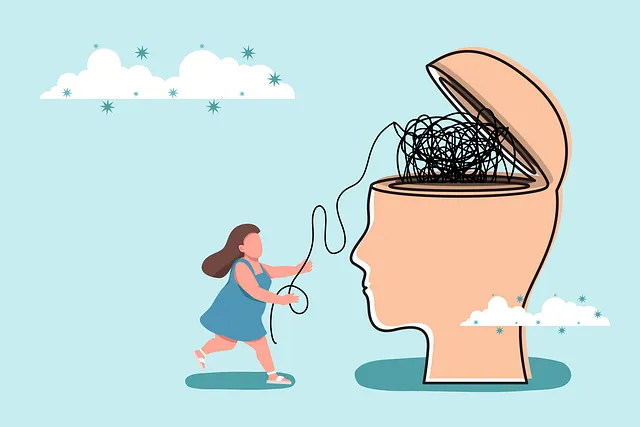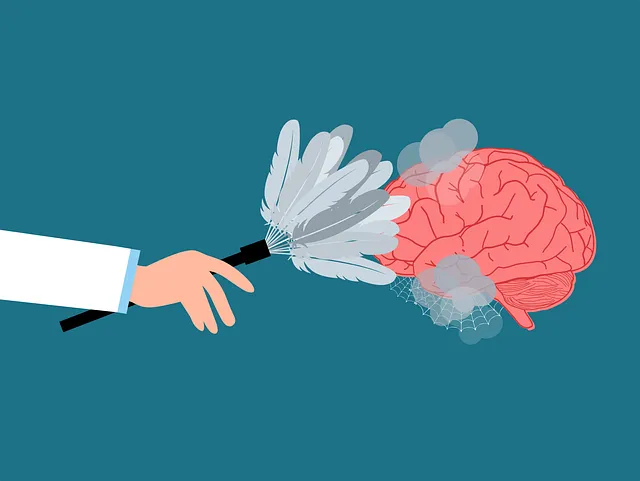The Kaiser Permanente mental health access center in Parker offers a comprehensive approach to depression prevention through early detection, education, and lifestyle changes. They emphasize the importance of recognizing signs like persistent sadness, sleep disturbances, and changes in appetite. Regular physical activity, balanced diets, and quality sleep are highlighted as key components for strengthening mental resilience. Building a strong support network and prioritizing self-care practices like mindfulness and meditation are also crucial. The center advocates for prompt help-seeking and empowers individuals with coping strategies to improve overall well-being.
Depression is a prevalent yet treatable condition, with early intervention playing a pivotal role in recovery. The Kaiser Permanente mental health access center in Parker offers valuable insights into prevention strategies, emphasizing the importance of recognizing signs and symptoms. This article explores various approaches to combat depression, including lifestyle modifications such as exercise, diet, and sleep routines. We’ll also delve into building supportive networks, mindfulness practices, and effective coping mechanisms, all inspired by the resources available at Kaiser Permanente Parker.
- Understanding Depression: Recognizing Signs and Symptoms (Focus on early detection from Kaiser Permanente mental health access center Parker)
- Lifestyle Changes for Improved Mental Well-being (Emphasize the role of exercise, diet, and sleep as preventive measures)
- Building a Support Network: Connections for Depression Relief (Discuss the impact of social connections and professional help)
- Mindfulness and Coping Strategies: Tools from Kaiser Permanente mental health access center Parker
Understanding Depression: Recognizing Signs and Symptoms (Focus on early detection from Kaiser Permanente mental health access center Parker)

Depression is a serious mental health condition that can significantly impact an individual’s daily life and overall well-being. Early detection plays a crucial role in managing and preventing depression, making resources like those offered by the Kaiser Permanente mental health access center in Parker invaluable. This center focuses on empowering individuals to recognize signs and symptoms of depression, aiming to foster mental health awareness and reduce the stigma associated with mental illness.
Through education and support, they encourage folks to build resilience, a key factor in preventing depressive episodes. By understanding common indicators such as persistent sadness, changes in appetite or sleep patterns, feelings of worthlessness, and difficulty concentrating, individuals can seek help promptly. The center’s approach emphasizes the importance of early intervention, which has been shown to significantly improve outcomes and enhance one’s ability to navigate life’s challenges with greater resilience.
Lifestyle Changes for Improved Mental Well-being (Emphasize the role of exercise, diet, and sleep as preventive measures)

Depression prevention starts with making conscious choices to improve one’s lifestyle. Regular physical activity is a powerful tool against depression; it stimulates the release of endorphins, often referred to as ‘feel-good’ hormones, which can boost mood and reduce stress. The Kaiser Permanente Mental Health Access Center in Parker encourages individuals to incorporate at least 30 minutes of exercise most days of the week, whether it’s a brisk walk, yoga, or team sports.
Nutrition also plays a significant role in mental well-being. A balanced diet rich in fruits, vegetables, whole grains, and lean proteins can positively impact brain chemistry. Additionally, certain nutrients like omega-3 fatty acids and vitamin D have been linked to improved mood and cognitive function. The center suggests consulting with a healthcare professional or registered dietitian to tailor nutritional strategies to individual needs. Furthermore, prioritizing quality sleep is essential; it allows the body and mind to rest, recover, and rejuvenate. Mind Over Matter principles emphasize the power of self-care practices, such as establishing a consistent sleep routine, to create a solid foundation for mental resilience.
Building a Support Network: Connections for Depression Relief (Discuss the impact of social connections and professional help)

Building a strong support network is an integral part of preventing and managing depression. Social connections play a significant role in our overall well-being, and when faced with mental health challenges, they can be a powerful tool for recovery. According to research supported by Kaiser Permanente’s Mental Health Access Center, having a robust support system helps reduce the risk of depression and promotes healthier coping mechanisms. Sharing feelings and experiences with trusted friends, family, or even supportive communities can alleviate the burden of loneliness and provide valuable perspectives.
Professional help is another crucial element in depression prevention and management. A healthcare provider equipped with cultural competency training can offer personalized guidance, especially when considering the unique needs and challenges of diverse populations. Mental Health Education Programs designed to promote Mind Over Matter principles empower individuals to take charge of their mental health. These programs often teach coping strategies, stress management techniques, and resilience-building skills that are essential in preventing and overcoming depression.
Mindfulness and Coping Strategies: Tools from Kaiser Permanente mental health access center Parker

At the Kaiser Permanente mental health access center Parker, experts emphasize that mindfulness and coping strategies are powerful tools in depression prevention. Incorporating a self-care routine development for better mental health can significantly enhance emotional resilience. Practices such as meditation, deep breathing exercises, and mindful walking can serve as effective stress reduction methods, helping individuals navigate life’s challenges with greater equanimity.
Through these techniques, one gains the ability to observe thoughts and emotions without judgment, fostering improved emotional regulation. The Kaiser Permanente center advocates for daily mindfulness practices, which can range from dedicated meditation sessions to simply pausing for mindful moments throughout the day. This approach not only reduces stress but also cultivates a deeper connection with one’s inner self, promoting overall well-being.
Depression prevention is a multifaceted approach, as highlighted by the experts at the Kaiser Permanente mental health access center Parker. By understanding depression’s signs and symptoms through early detection, adopting healthier lifestyles with focused exercise, diet, and sleep, building supportive networks, and utilizing mindfulness techniques, individuals can significantly reduce their risk. Remember, reaching out for professional help and fostering meaningful connections are key components in navigating life’s challenges. The resources provided by Kaiser Permanente mental health access center Parker offer practical tools to empower individuals in their mental well-being journey.






